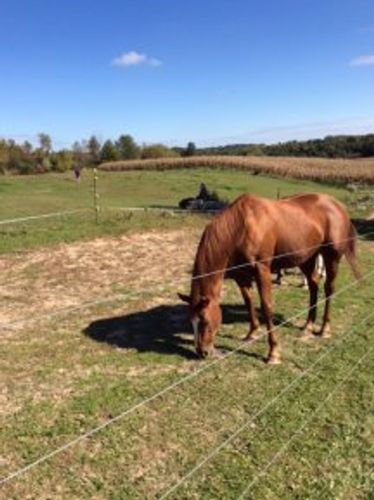Here's a story about a horse. This horse had a new home and a new owner. A fresh start. We'll call him "Z". Z was a tall horse for his breed. He also had some issues. You see, Z didn't like it when he was groomed or saddled. He didn't like having his head or his girth touched. He'd turn and bite people. He'd kick. You need to be careful around horses anyway, but you had to be extra careful around Z.
When people groomed Z, they put him in shortened cross-ties to keep him from swinging his head around to bite. They also had to be very careful to not get kicked. A trainer suggested that I come in to see if Equine MFR might help Z be a happier, more comfortable horse. I agreed. One of his people was there and had him in the cross-ties. Both to observe and to help keep us both safe. Z had numerous tender and tight spots. On his back, his belly, his neck and his head. It took a little bit to convince Z that he was safe & it was OK for me to touch him. By the end of that first session, I was able to ask that the cross-ties be loosened a bit and he was hanging his head, eyes half closed and licking his lips. These are signs of a happy, relaxed horse.
Z & I worked together twice a month for about 8 months. I suggested talking to the vet about some supplements/diet issues since Z's belly was always so tender. Changes were made. Between diet, approach and MFR sessions Z became a much happier horse. Do you still need to be careful around Z? Yes. I didn't change his personality and Z likes his space. When you enter it, you need to be respectful and move slowly. He's able to be groomed and I'm told he's a lot easier horse to handle. He also now loves having his head rubbed! All of which are good things.
How does this relate to people? When you're in pain, you've been dealt with in ways that upset you or caused you to hurt, how good of a mood are YOU in? MFR is a way to work with the places that hurt gently and carefully that helps to relieve the pain. Yes, sometimes working on the areas that hurt, hurts! I know this from experience. I also know that it takes about 2 days and I feel better than I did before. Often, MFR is very relaxing. The key, which I talk to clients about frequently, is to follow the body and never, ever, force. A horse won't LET you force it. Trying to force a horse is an extremely good way to get kicked, bit or thrown. Try to force your human body to do things and what happens? You get hurt.
Help me help you, your friends and your family who are dealing with pain in a safe, drug free way that can let the body heal. Thank you!
It's been a great Summer! Remember to come see me as part of your self-care routine. Did you know that MFR can be preventative? I know I talk a lot about using MFR to help you heal. It can also help you from getting injuried in the first place. Together we can catch things BEFORE they become a full-blown pain.
A note about working on horses in WI & MN: Equine Massage/Bodywork/MFR is not a substitute for the care of a veterinarian. Instead, it is done in collaboration with your vet as a part of a horse's care. Your horse's vet must sign a release form to proceed with equine massage of any kind.
Happy Healing!














